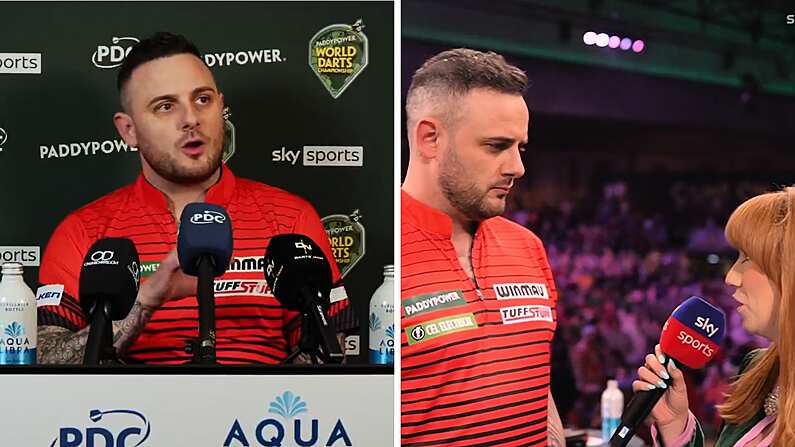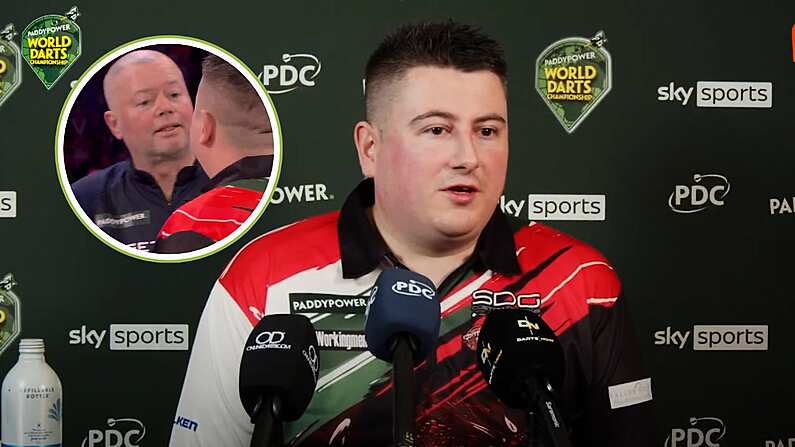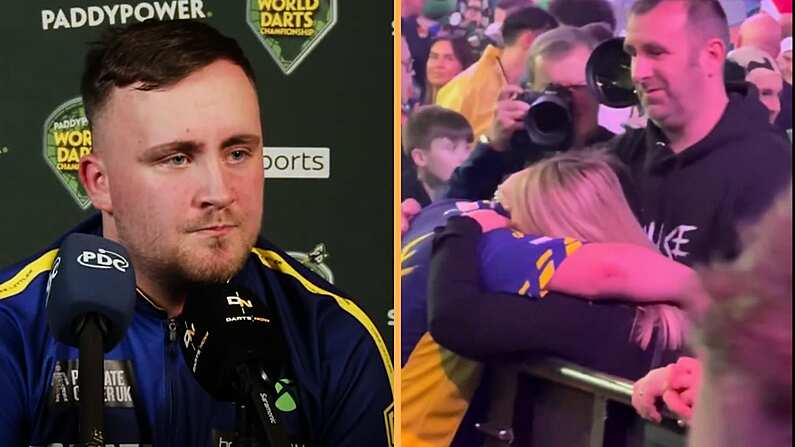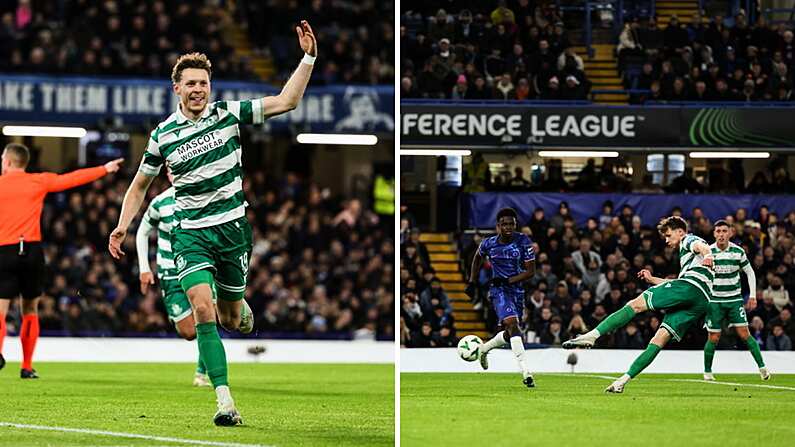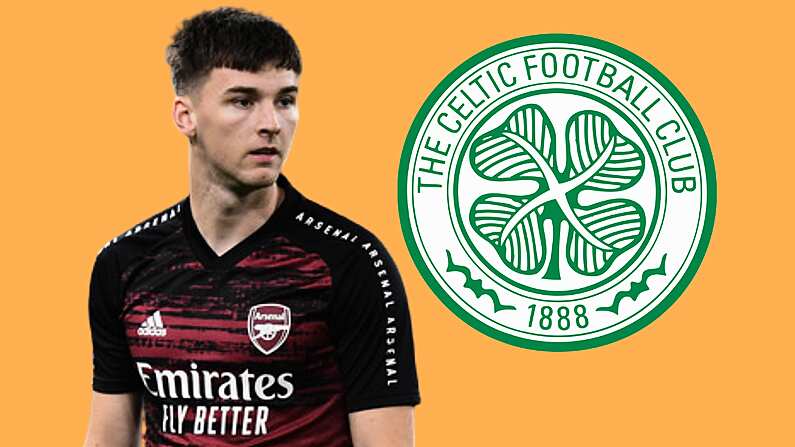In the wake of last night's brilliant Rough Rider, here are 30 Irish sports documentaries that need the 30 for 30 treatment.
SOCCER
1. Keano and Saipan
The first choice was a no brainer.
Roy Keane's departure from Saipan in 2002 was arguably the most iconic moment in Irish sporting history. It divided families and consumed the us all and had the bar flys of Ireland gulping more stout and spouting more nonsense than ever before.
The brilliant recent four part series on RTE, "Green is the Colour" gave a fantastic account of the dispute; the only downside being that they had a limited number of minutes to cover it.
Turn May 23, 2002 into a full 60 minute documentary, and the Irish 30 for 30 has it's marquee opening.
2. Thierry Henry and That Night in Paris
The most recent controversy in Irish soccer came three years ago, quite literally at the hands of Thierry Henry.
Henry's handball that dashed Ireland's World Cup dreams was more than just a handball though. It was a handball which sparked debate worldwide. It became political. There were appeals to make Ireland the "33rd team". It had Irish Arsenal fans burning their shirts which carried his name, gladly watching their former hero's number burn to ashes before their eyes. People boycotted Henry hoovers. The French became absolute enemies.
Similar to Saipan, while well covered on RTE recently, a full length documentary would make for required viewing.
3. The Charlton Era
The Charlton era saw the most successful period in Irish soccer history. We qualified for three major tournaments, and took some scalps along the way.
The 10 years or so that Big Jack led Ireland through the world rankings saw the game boom in Ireland, and although the football wasn't pretty, the innocence and excitement of the World Cups and European Championship is looked back on as one of the most memorable eras of Irish sport.
4. Paul McGrath
One of the rocks behind Ireland's successes of the late 80s and early 90s was Paul McGrath.
On his day, McGrath was in a different class, and it pains me that I was just too young to fully appreciate it at the time. The pitch was where everything made sense to him, and even with the knee trouble of a mafia rat, it was where he could forget about all the demons he would face when he left it.
McGrath, as a stand alone icon, is about as fascinating as we have seen in the last 30 years of Irish sport. On the basis of his autobiography, which was beautifully put together by Vincent Hogan, a full documentary on the man who the Italians found unbeatable in 94 would be far and away the most emotional in this series.
5. Kerr's Kids - Where are they now?
This story would be one of the documentaries I would most look forward to seeing.
In 1998, the country started rowing in behind an unfancied bunch of lads, who won our country's first international tournament, and even took the Germans in a shootout.
Brian Kerr's successes with Irish underage sides in the 90s was unprecedented, unexpected, and unbelievable. It was the catalyst behind the future careers of a few of Irish soccer's most influential players of the last 10 years, and was surprisingly left out of RTE's "Green is the Colour" series recently.
Some of the squad from that tournament have gone on to have impressive careers. Robbie Keane is the country's all-time leading scorer and captain. Richard Dunne is the cult hero and the Iron Curtain of that night in Moscow. Stephen McPhail was hit with injuries throughout a previously promising career, but went on to captain in an FA Cup Final.
Others didn't quite have glittering careers though, and this would be the most interesting aspect. Now in their 30s, where are the heroes of 98? Where are Kerr's kids?
6. Who killed the League of Ireland
The inspiration for the title of this documentary comes from the original 30 for 30, "Who killed the USFL",which looked at the United States Football League as it tried to challenge the untouchable NFL, and specifically, the role that Donald Trump had to play in it's meteoric success and demise.
For years we've been having grave problems with our domestic soccer league, and even as recently as this week, we heard of the sudden decision to wind up Monaghan United.
In the past 10 years, established and iconic Irish soccer clubs have been folding and re-opening on a whim. Attendances are dismal, the perception of the football is worse, and the players have been leaving as soon as they get a better chance.
In the past couple of seasons we have seen a small breakthrough for a small number of clubs, pioneered by Shamrock Rovers' European run, but this has also masked over the major issues that clubs like Monaghan still face.
RUGBY
7. Ireland's Grandslam
They had only been waiting 61 years.
Sixty one years to win four and five games on the trot. Sixty one years of January hope and March anguish. Sixty one years of being the nearly boys. Sixty one years of watching the English and the French and the Welsh and even the Scots getting one over on us. Sixty one years was way too long to wait.
After Ireland finally conquered their grand slam demons in 2009, RTE produced the greatest Irish sports documentary ever, which even three years on can still give me a lump in the throat at the end.
The final minutes in the Millennium Stadium that day will forever go down one of the most punishing my finger nails have ever endured.
8. The Miracle Match
It was a toss-up between this, and Munster's first Heineken Cup triumph at the third time of asking in 06. For me though, the "Miracle Match" against Gloucester in 2003 was as close as possible to sum up the whole Munster rugby ethos in one match.
As a Munster fan, this was one of the truest occasions when Munster felt like the parish. It was the impossible made possible.
It was the tailor-made sports movie script; The badass team who had already beaten them showing up with a swagger; The need to win by a colossal margin, and doing it with one of the last kicks of the game; The crowd showing up in hope rather than expectation; The players celebrating like they'd won the cup at the end.
All of these things made the Miracle Match special. A sports documentary examining this whole occasion would be wonderful viewing.
9. Leinster's Dominance
In 2012, Leinster secured their place as the most dominant club side, European rugby has seen.
They have obliterated Munster's long-held reign as Ireland's number one, and have clinically disposed of everything the Heineken Cup has thrown at them.
More than likely a documentary best left until this current crop of players have moved on and retired, it would be fascinating to hear the real thoughts of this ruthless rugby machine.
10. Brian O'Driscoll
One of the main reasons that Leinster have won three Heineken Cups and Ireland have won a grand slam, is Brian O'Driscoll - the greatest Irish rugby player ever.
O'Driscoll isn't just a natural talent though. He's consistently come across as a leader and a model pro. He's as clutch as Jordan and as brave as Jesse Owens and as influential in Irish sport as anyone has arguably ever been.
In short, 30 for 30s were made to celebrate people like him.
11. The English in Croker
If you were to make a list of the three most anticipated games in Irish sports history, this one would feature on almost every list.
Everything surrounding it was spectacular; from the struggle to get Croke Park to open its doors, to the celebrations after, when one of our most emotional sporting moments produced one of our finest ever hours.
60 minutes of interviews with the players and the fans who remember Hayes and Flannery with tears flowing down their faces, and Shaggy's leap in front of the Canal End which lifted the roof off the Hogan Stand, is a must on our list of the Irish 30 for 30.
GAA
12. Not Quite the Five in a Row
There isn't a Kerryman alive who couldn't tell you who Seamus Darby is.
Back in 82 - and right on the verge of our 30 year window - Darby scored the latest of goals for Offaly in the All-Ireland final, defeating Kerry and most importantly, crushing their dreams of winning that five in a row.
The oldest moment in our series would look at what that goal did for Seamus Darby, and how it turned a substitution from 30 years ago into one of the most popular table quiz answers in the country.
13. Jim Stynes - The Trailblazer
Even though the International Rules series had already begun, Jim Stynes was the first real success of the Irish Experiment in AFL. Stynes was the catalyst for Tadhg Kennelly and Setanta O'Hailpin and Tommy Walsh and Colm Begley.
He was the reason Ricky Nixon went on scouting missions around Ireland during the summers, looking on from every sideline in the country for the next Jimmy Stynes. Stynes's death this year and the obituaries which followed, proved to the country why if it wasn't for Stynes, Aussie Rules and Gaelic Football wouldn't have the relationship they do now.
14. The Dubs - 16 Years Waiting
The neutral always loved to hate the Dubs.
But when Stephen Cluxton glided his free effortlessly towards The Hill, the neutrals felt strangely pleased.
The most passionate fans in the country were finally getting their reward, and they deserved it.
During the Winter, RTE produced a wonderful documentary on the Dubs finally getting the 16-year-old monkey off their backs, and it would have a worthy place in this series.
15. Leitrim winning Connacht
Football doesn't have many obvious draws over hurling, but the chance of a Cinderella story is one of them.
In 94, John O'Mahoney orchestrated one of the greatest ever in football history when his Leitrim side beat Connacht's heavyweights, Galway and Mayo, back to back, to record their first provincial success in 67 years, and only their second in history.
Cinderella stories make great documentaries. This one will, too.
16. Cormac McAnallen
In 2003, Cormac McAnallen was set to be one of the brightest talents in football.
He was part of the Tyrone team that won their first All-Ireland title in September, switching effortlessly to full-back from midfield that season. He had just won an All-Star and at just 24, had plenty more to come. He was a leader too, and captained them to a McKenna Cup in early 2004.
Shortly after, Cormac died suddenly, and it shook the entire nation to it's core. Even since, Tyrone GAA has been hit with a series of tragedies.
More than eight years later, I feel it would be fascinating to hear from those who knew Cormac, as the football star and leader and icon he was, and the effect his passing had on them.
17. Clare saying goodbye to Biddy Early
81 years is a long time to wait for an All-Ireland, especially when there is apparently one of the great sporting curses sitting over the county; the curse of Biddy Early.
It is believed that Biddy put a curse on the team in 1932, decreeing that Clare would not win an All-Ireland until the entire current squad had died.
By the time the 1995 All Ireland final had rolled around in 95, there were just three survivors left from that 1932 side, and much of the talk would be of the famous curse hanging over Ger Loughnane's men.
The victory which followed was one of the most iconic in All-Ireland history.
18. Offaly's Sumnmer - 1998
The Offaly hurling summer of 1998 was one of the campaigns made for a documentary.
They had been well beaten in the Leinster final that year by Kilkenny, but after a change in manager, eventually found themselves in an All-Ireland semi against Munster Champions, Clare.
After a drawn first match, The Banner led by three with more than two minutes to play in the replay, but when the referee's full-time whistle was blown exceptionally early, the Offaly fans staged a sit-down proteston the Croke Park pitch, and were eventually awarded a second replay.
After overcoming round three against Clare, Michael Bond's side found themselves against their Leinster rivals Kilkenny, and capping off an incredible season by defeating them.
19. Limerick's Nerves
Blowing a late lead in an All-Ireland final is enough anguish for any man to handle. When you do it twice in three years, it becomes too much to fathom.
Limerick hurling has never really recovered from the late final meltdowns it suffered against Offaly and Wexford in 94 and 96, as well as a thrilling Munster defeat against Clare in 95, and are now looking at 16 years since a Munster title victory.
The county's suffering during the mid-90s is one of the most heartbreaking eras any team has endured in the modern game and is tailor made for an in-depth sports documentary.
20. The Best That Never Was
Borrowing the title from 30 for 30s documentary on Marcus Dupree, The Best That Never Was will examine one of the most underachieving sides modern hurling has seen.
The Waterford side from 2000-2010 were arguably hurling's most exciting team to watch, and in another era, may well have won two or three All-Irelands.
They had Ken McGrath and John Mullane and Big Dan and Tony Browne, guys who were missing teeth and helmets and seemed to play hurling on passion and instinct, the kind of guys who just lived for sunny afternoons in Semple Stadium.
In the end, despite great success in Munster, this Waterford side failed to deliver on the All-Ireland circuit, and a look back over this lost chance to add to their two titles would be wonderful to see.
ATHLETICS
21. Sonia in Sydney
When you consider the disappointment of Atlanta 96, Sonia O'Sullivan's silver medal in Sydney four years later is noting short of remarkable.
During the four years between Atlanta and Sydney, Sonia used the pain she had endured as inspiration, turning her career around by winning two golds at the European Championships in 98, and eventually righting the wrongs of 96 by picking up a silver medal after a nailbiting finale with Gabriela Szabo.
As one of Ireland's greatest athletes, documenting the four year journey would be a vital part of this series
22. Eamonn Coughlan
Now a Senator, Eamonn Coughlan has had one of the most decorated careers of any Irish athlete.
A three time Olympian, a former World and European Champion, and a successful college athlete in the US, Coughlan's career provides a fantastic platform for a full profile documentary.
GOLF
23. 2006 Ryder Cup
In 2006 at the K Club, Europe destroyed the United States to record one of the most emotional and crushing Ryder Cup victories ever, their third in a row.
The main story centered around Darren Clarke, who was included as a wildcard, despite the recent death of his wife. Despite the emotion, Clarke earned three points in Europe's stunning victory.
The version of Fields of Athenry on the first tee in the pouring rain has become an iconic moment in Irish sport, and this whole weekend was the first in a now long list of recent Irish success stories in golf.
24. Harry's Majors
Despite the natural talent of McIlroy, the scrambling McDowell at Pebble Beach, and the shock win for Clarke at Sandwich, Padriag Harrington's three majors in 13 months will go down as the greatest feat in Irish golf.
The nature of the victories were just as remarkable. In Carnoustie in 2007 he found the famous Barry Burn twice on 18, but held on in a playoff with Sergio. 12 months later at Birkdale, he was dominant on the final day, and his stunning 5 wood on 17 was the shot of the tournament, all but sealing victory.
The following month, Harrington won his third major at Oakland Hills, defeating Sergio Garcia on the final day, the same man he beat in a playoff at the Open 13 months previous.
SWIMMING
25. Michelle and her Medals
One of the reasons that the 30 for 30 series was created was to further examine important events that have been somewhat forgotten through the years.
Michelle Smith's four medal haul at Atlanta was at the time the greatest achievement by an Irish Olympian, so when she was found guilty of tampering with a urine sample in 1998, the Irish public wiped any record of her success, despite never being stripped of her medals or records.
This combination of a great success and great scandal provides the perfect blend for a gripping sports documentary.
CYCLING
26. Stephen Roche and the Triple Crown
The late 80s and early 90s was a golden period in Irish cycling, and despite Sean Kelly's more consistent career performances, it was Stephen Roche's historic triple crown success in 1987 which grabbed the headlines as he became only the second man ever to do so.
Roche won the Giro d'Italia, the Tour de France and the World Road Race Championships that year, but faced persistent doping allegations in the years that followed making him one of the most controversial champions in Irish history.
CRICKET
27. Ireland's World Cup Dreams
Ireland's cricketers seem to love adversity. And their quest for test status has been a fight from start to finish.
In 2007, at their first ever World Cup, they pulled out a draw against Zimbabwe and a Paddy's Day victoryagainst tournament heavyweights Pakistan, whose head coach was later found dead in his hotel room.
Four years later, against England, Kevin O'Brien pulled off the fastest ever World Cup century, inspiring the tournament's largest ever run chase to secure the greatest victory in Irish cricket.
They continue to improve and fight for test status, and are a wonderful example of a minority sport trying and succeeding in improving their profile.
SNOOKER
28. The Final Black and the Final Frame
The 1985 World Snooker final is one of the occasions I rue not being older for.
It wasn't just because Northern Irishman Dennis Taylor made a remarkable comeback or because it was against goldenboy Steve Davis. This one went down to the final shot in the final frame.
That never happens.
Down the years, countless features and documentaries have been made about snooker's greatest match. One more would be just lovely.
BOXING
29. Barry McGuigan
Also in 1985, Barry McGuigan defeated WBA featherweight title holder Eusebio Pedroza over 15 rounds to become World Champion.
That night in London has gone down as one of the greatest moments in Irish boxing, and The Clones Cyclone went on to become inducted to the Hall of Fame.
As well as his triumphs, McGuigan has endured a tough life, and in 1982 when he sent Young Ali into a coma from which he never recovered, he even contemplated retirement.
30. Darren Sutherland - One of the Saviours
Darren Sutherland's smile was one of the highlights of the 2008 Olympics.
The Irish middleweight returned from Beijing as a hero, with a bronze medal dangling over his neck, and the dream of going pro ahead of him.
After an explosive start to his professional career at super-middleweight, the Irish public and boxing fraternity were shocked when he took his own life in September 2009.
Sutherland featured in the beautiful documentary, "Saviours" which followed the lives of three boxers from the St Saviour's Boxing Club in Dublin from 2005-2007.
A new documentary examining his untimely death and short but successful career would be a beautiful finale to the 30 for 30 series.
The great work of Neil Treacy – read more at his blog.


